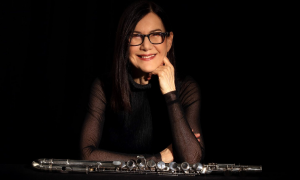Home » Jazz Articles » Interview » Jim Hall: The Elegant Guitarist
Jim Hall: The Elegant Guitarist
I think of breathing, rather than just playing a million notes. A phrase should have a destination.
 There's good news and better news for the many fans of guitar great Jim Hall—counted among them a number of established guitarists who are, themselves, eminent. It would be hard to find a guitarist who doesn't look up to Hall and whose playing has not been influenced by him in some way. Players relish Hall's rich sound—the interesting melodic and harmonic ideas, the way he lets music breathe, the phrasing. The good news is that his most recent recording, the double CD Hemispheres came out in the latter part of 2008 on ArtistShare, teaming Hall with the amazing
There's good news and better news for the many fans of guitar great Jim Hall—counted among them a number of established guitarists who are, themselves, eminent. It would be hard to find a guitarist who doesn't look up to Hall and whose playing has not been influenced by him in some way. Players relish Hall's rich sound—the interesting melodic and harmonic ideas, the way he lets music breathe, the phrasing. The good news is that his most recent recording, the double CD Hemispheres came out in the latter part of 2008 on ArtistShare, teaming Hall with the amazing 
Bill Frisell
guitar, electricb.1951
On the first disc, the two weave their magic, playing duets in an intimate room that is part of bassist Tony Sherr's apartment in Brooklyn. On the second disc, the guitar masters are joined by the ever-sensitive 
Scott Colley
bassb.1963

Joey Baron
drumsb.1955
Hall and Frisell have played together a bit over the years. In Frisell, Hall finds a partner whose guitar work is also a big influence on musicians of his era and younger. Frisell, as a teenager, "took lessons from me for a few weeks," says Hall. Yet there is a sense of adventure and surprise in Frisell's playing that attracts Hall. "I literally laugh out loud when I go out and hear Bill play. I never know what's going to come out," he says. "Bill and I worked with a quartet—I think it was at the [Village] Vanguard [in New York City], years ago. I left all my electronic do-dads at home. I was the straight man.
"That's pretty much what I did on this double CD. It was marvelous. Bill and I were sitting on a couch, almost shoulder to shoulder—it was that close—listening and reacting. It worked out really well. Maybe the first session was a little bit tentative. Then we got into it," says Hall.
Chapter Index
- Hemispheres
- Approach and Sound
- Charlie Christian Changes Everything
- New York, Sonny and More
- Other Guitarists
- Approach and Sound
The duet portions were recorded in cozy quarters in five sessions over the latter half of 2007. The musicians and producer Brian Camelio of ArtistShare took their time revisiting the music and subjecting it to scrutiny before returning for more recording. A lot of music, including versions of standards like "My Man's Gone Now" and "Pannonica," was recorded. However, the sessions were trimmed to 10 selections for the CD release, including Bob Dylan's "Masters of War," which was new to Hall, but a song whose lyrics he found appealing and applicable to today's world. There's a tender treatment of Hall's "All Across the City," a serene ballad with soft, sympathetic playing. "Bags' Groove" is fairly straight, swinging. Each guitarist makes his statement understated, but musical. On "Migration," the longest free improvisation, spacey effects from Frisell lend an ethereal feel. Hall saunters through that background in a calm and amusing fashion, never becoming boisterous. "Beijing Blues" is a short, playful exchange over a bouncing blues riff. Says Hall, "'Migrations' goes on for almost 15 minutes. That was a free association piece. At first that seemed like it needed to be cut down. Then we thought, "What the heck, leave it." I like the way it went. I think the communication got to be really excellent, mostly out of respect, sitting that close to one another and listening and reacting and not worrying about whether the record company is going to ask us to play 'Tea for Two' or something like that."
On "Migration," the longest free improvisation, spacey effects from Frisell lend an ethereal feel. Hall saunters through that background in a calm and amusing fashion, never becoming boisterous. "Beijing Blues" is a short, playful exchange over a bouncing blues riff. Says Hall, "'Migrations' goes on for almost 15 minutes. That was a free association piece. At first that seemed like it needed to be cut down. Then we thought, "What the heck, leave it." I like the way it went. I think the communication got to be really excellent, mostly out of respect, sitting that close to one another and listening and reacting and not worrying about whether the record company is going to ask us to play 'Tea for Two' or something like that."
With ArtistShare, musicians have control over what goes into a recording and much greater control of the product once it is released. It was Camelio who came up with the Hall-Frisell duet idea, says Hall. Then, "It felt to both Bill and me that maybe the duet stuff needed a little beefing up, so I was able to go into the studio with Bill, Joey Baron and Scott Colley. We did the quartet stuff there, which I think helped balance it out."
Hall has a history with both rhythm section mates—Baron with a trio he formed that had Steve LaSpina on bass, and Colley at various times in intimate settings, as well as on the 2004 ArtistShare album Magic Meeting. "Both Scott and Joey can go in any direction. Scott can play really beautiful straight rhythm bass on standard tunes and he can also—I hate to call it free improvisation—but just listening and reacting no matter what comes up, whether it's a shape or a free-form piece. Joey's the same way."
The setting for the quartet changed to Sear Sound in New York City, and the sound was engineered by Joe Ferla. It was done in one day, and only a few weeks before the CD was to be released. They kept the atmosphere intimate.
"The setup in the studio was marvelous," says Hall. "We tried it in a different studio before. There were all kinds of separating pieces of glass. It was not what we meant to do. But when we recorded for Hemispheres, I was literally so close to Joey Baron I could reach out and touch the cymbals. That was the feeling we wanted with that group."
That intimacy is immediately apparent with "I'll Remember April," with Baron laying down a beautiful samba-like rhythm on brushes, and Colley's rich sound on the bass adding the perfect punctuations. The guitarists get to prance on that foundation and do so in fine fashion. Colley's solo is delicious. There's a lushness to "Chelsea Bridge" that creates a swoon. "My Funny Valentine," on the other hand, is not melancholic but it has more swing and the improvised lines give it a different feel. "Sonnymoon for Two" finds the guitarists speaking back and forth, exuberant, on the 
Sonny Rollins
saxophone
b.1930
"The [quartet] interaction is a bit different. But there again, with those two guys—Scott and Joey—it took the form of pretty much what Bill and I had been doing as a duo, only stretched out a little among four instead of two," says Hall. He says that by the time of the quartet session, he had recovered from the back surgery, but "there was not much time to do any composition. I wish there had been more original, unusual material in the quartet thing. But the fact that we did that many standards probably helped balance the thing out. I did that one [original], 'Owed to Freddie Green,' which I get a kick out of."
 Jim Hall and Bill Frisell
Jim Hall and Bill Frisell
Hall is pleased with the double-disk recording. It's not Hall's first ArtistShare project. Magic Meeting, with Colley and 
Lewis Nash
drums
b.1958
Geoffrey Keezer
keyboards
b.1970
class="f-right">
Hall's playing in any setting is clear and uncluttered. The stories he tells are told with economy, but it is the sense of time, the expressive feeling and the serious search for something a bit different that have attracted other musicians and fans to the Buffalo, New York, native for decades. He's gentle and subtle, also playful. And the approach can vary somewhat with the six of the group. Hall prefers small band configurations.
"With a quartet, occasionally I'm part of a rhythm section. It's like the difference between being with somebody and talking—just the two of us in a room—then going to a party together where we're still friends, but we're across the room from one another. There are other people involved.
 "I like the smaller groups. Certain piano players I love—Geoff Keezer is amazing to play with, and of course,
"I like the smaller groups. Certain piano players I love—Geoff Keezer is amazing to play with, and of course, 
Bill Evans
piano
1929 - 1980
Joe Lovano
drums
b.1952
Writers for years have talked about his spare, bluesy "round" sound, "lyrical," "harmonically fertile," "poetic" and subtle way with his instrument. It's all accurate. Elegance can also be applied.
"I probably got my idea for the sound partly listening to [saxophonist] 
Ben Webster
saxophone, tenor
1909 - 1973
Coleman Hawkins
saxophone, tenor
1904 - 1969
Don Byas
saxophone, tenor
1912 - 1972
"I imagine my own sound and concept came from stuff like that. Because I think of breathing, rather than just playing a million notes. A phrase should have a destination, and you take a breath and let your brain, and maybe the audience, think about it. I think a lot of it came from saxophone players," says Hall, adding, "
Paul Desmond
saxophone, alto
1924 - 1977
class="f-right">
Charlie Christian Changes Everything
Hall didn't spend much of his life in western New York, where he was born. By about age eight, he was in Cleveland. He was introduced to music at home by his mother, who played piano.
"My mom gave me a guitar when I was nine or ten. She had a brother, my Uncle Ed, who played guitar. He played country music and sang country songs. So I got a guitar and started taking lessons. Then I started working with these little groups. There was no bass. It was drums, accordion and clarinet, maybe saxophone. So I played rhythm as well."
Hall was 13 when he started working in a local band, led by a clarinetist. "That's when I first heard 
Charlie Christian
guitar, electric
1916 - 1942
Benny Goodman
clarinet
1909 - 1986
Django Reinhardt
guitar
1910 - 1953
Says Hall, "Somehow, I knew I wanted to be a musician. I managed to get through the Cleveland Institute of Music. I was there for five years. I had a friend who worked in the office, so they let me pay the tuition a little at a time. That was one of the brightest things I've ever done—was to go to school to become a better musician. That worked out great for me."
"I was going to continue and get a master's in composition. I knew nothing about classical music. I liked Hindemith, probably because he reminded me of 
Stan Kenton
piano
1911 - 1979
Woody Herman
band / ensemble / orchestra
1913 - 1987
"There was this thing then where you could deliver a car somewhere and just pay for the gas. My friend, a saxophonist, was going to Los Angeles doing that. So I just took off and went with him. We drove this lavender Cadillac out to L.A. I had a friend there. I stayed with my great-aunt for a while. I was 24 or something like that. Maybe 25."
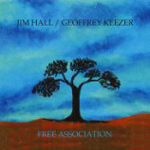 It was there he landed a gig with the Chico Hamilton Quintet with Buddy Collette on reeds. "My friend, Joe Dolny—he had a rehearsal band at the musician's union. He was a great arranger. I was playing with that band. There was a French horn player in the band, Johnny Graas. I went over to John's house to rehearse some stuff. Chico called, looking for a guitarist. I always say I feel like Lou Gehrig without the disease. I was just there. John says, 'Here's one.' So I talked to Chico and we hooked up. That worked out great."
It was there he landed a gig with the Chico Hamilton Quintet with Buddy Collette on reeds. "My friend, Joe Dolny—he had a rehearsal band at the musician's union. He was a great arranger. I was playing with that band. There was a French horn player in the band, Johnny Graas. I went over to John's house to rehearse some stuff. Chico called, looking for a guitarist. I always say I feel like Lou Gehrig without the disease. I was just there. John says, 'Here's one.' So I talked to Chico and we hooked up. That worked out great."
From there, he moved on to Jimmy Guiffre's band that was experimenting with different improvisational forms. Eventually, the trio was Guiffre's reeds with Hall and the trombone of Bob Brookmeyer, a group that can be seen on Ben Stern's classic 1960 jazz film, Jazz On A Summer's Day (now distributed through New Yorker Video), that chronicles the 1958 Newport Jazz Festival. Guiffre was eventually managed by Norman Granz, which brought the guitarist to the famous producer's attention and led to opportunities like joining 
Ella Fitzgerald
vocals
1917 - 1996
"I took 
Herb Ellis
guitar
1921 - 2010
Tommy Flanagan
piano
1930 - 2001
class="f-right">
Around 1960, Hall made the move to New York City, helped by the estimable pianist/composer/arranger 
John Lewis
piano
1920 - 2001
"I had gotten to know John. We did the record, Grand Encounter: Two Degrees East - Three Degrees West (Pacific Jazz, 1956) with Chico, 
Percy Heath
bass, acoustic
1923 - 2005
Miles Davis
trumpet
1926 - 1991
Sonny Rollins
saxophone
b.1930
Rollins was returning from his fabled hiatus that found him into heavy woodshedding on the Williamsburg Bridge that crossed the East River in New York City near his home. Rollins—who, along with 
John Coltrane
saxophone
1926 - 1967
"It was great," says Hall of that association. "He was a marvelous bandleader. We wore uniforms. I was the pale face in the group. Sonny would make sure the clothes looked appropriate on each of us. He was great. He was, and is, a terrific role model."
"It got me practicing, I'll tell you that," says the guitarist, laughing. "It was daunting. I learned so much from Sonny. Sometimes, we'd be playing something with a nice groove. He wouldn't even have to tell us, but by the force of his playing, he would stop everything and kind of take the tune apart and examine it, then put it back together. It was a great experience, personally and musically."
Hall still reveres Rollins—who's the same age—today. "It's ridiculous. He's growing all the time. I had some long conversations with Sonny Rollins when I was in the hospital, which was fascinating because he was probably the most taciturn person I ever worked with. But we talked for 40 minutes when I was in the hospital. It was really great. Of course, everybody's thrilled with the way this last [U.S. presidential] election went. So I've been back in touch with a lot of those guys."
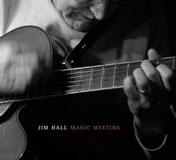
Another special association in the 1960s was with pianist 
Bill Evans
piano
1929 - 1980
Tony Scott
clarinet
1921 - 2007
Cannonball Adderley
saxophone
1928 - 1975
Paul Chambers
bass, acoustic
1935 - 1969
Philly Joe Jones
drums
1923 - 1985
"Then I was working with Sonny Rollins at the Jazz Showcase. It was a new club that didn't last too long. Bill came in one night and asked if I wanted to do a duet record and I said, 'Sure.' John Lewis had this music camp called the Music Inn in Lenox, Massachusetts. We were both teachers up there. So I had known Bill for quite a while, but we had never recorded together. We played together a bit. He came up with the idea of a duet and it worked out great [Undercurrent, Blue Note, 1962].
Evans' approach to the piano was different than many of the post-bop pianists of the day. "Bill had such a marvelous sense of texture. He liked me to play rhythm guitar. As soon as I started to play rhythm, he would automatically stop using his left hand. I guess he sensed that that part of the texture was covered. It was a great experience."
Hall also did outstanding work as part of trumpeter 
Art Farmer
flugelhorn
1928 - 1999
"I was there for three-and-a-half years, I guess. I was desperate to get out of that situation," he recalls, able to laugh at it now. "Merv had some fascinating guests, I remember. But the music—you can imagine what that was like." So it was back to jazz for Hall. "I started doing my own things, a lot with Ron Carter. Then the Griffin show, fortunately for me, moved out to Los Angeles. I didn't go with them. I started doing other stuff. First with Ron, then other settings. Ron and I still hook up occasionally."
His career has taken him to places around the world and into associations with some of the greatest musicians. All the while, he remains a huge influence on other guitar players and has worked on composing and arranging, as well. He's garnered accolades along the way from jazz magazines and the like. In 1997, he won the New York Jazz Critics Circle Award for Best Jazz Composer/Arranger, highlighted on his Telarc recordings Textures (1997) and By Arrangement (1998). He is the recipient of Denmark's Jazzpar prize and the National Endowment for the Arts Jazz Masters Fellowship award, and was appointed Chevalier, the highest rank in France's prestigious Ordre des Arts et des Lettres (Order of Arts and Letters), among others.
class="f-right">
Hall says he doesn't listen much to other guitarists, "I think, on purpose. I haven't for years." He even kept to his own focus in the latter 1960s when rock music began expanding and several of that genre's guitar gods emerged. Jimi Hendrix's sound and approach stirred many younger jazz guitarists.
"It turned out that he lived right on our block (in New York City)," says Hall. "I didn't really know who Jimi Hendrix was. I'd heard the name and I think he lived maybe in the next building. But when I heard him play [on record] the "Star Spangled Banner" at that festival in upstate New York [Woodstock in 1969], that just knocked me out. I said, 'That guy's OK.' Then there was this recording studio Electric Ladyland, that he had just started. I recorded there a few times. But I never really heard much of him. But he was quite different. That's usually what I base things on. He was sort of unique."
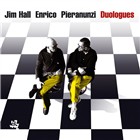 Over the years, Hall cites Christian,
Over the years, Hall cites Christian, 
Freddie Green
guitar, acoustic
1911 - 1987
George Van Eps
guitar
1913 - 1998

Peter Bernstein
guitar
b.1967
John Abercrombie
guitar
1944 - 2017
Chris Potter
saxophone, tenor
b.1971
Adam Rogers
guitar
b.1965
As for his own playing, Hall is still exploring, still learning. "That's the whole idea." Even his practice regime is set up so that he has something new and unknown to recognize, react and respond to.
"I have a couple of guitars. I don't have a whole collection. At the moment, I just have one in the apartment. Sometimes if I practice for a while, just to keep it interesting, I'll tune the guitar randomly, so I don't know what's going to come out. I'll practice that way, just sort of react to whatever comes out of the instrument. That keeps me guessing, to try to make music out of whatever is there. It's like improvisation, because you don't know exactly what is going to come out until you hit the note. Then you try to react and make something out of it. Sometimes on the bandstand, you screw up, but you try to make it work. Then you feel next time it will work out." He notes, "My other big interest is writing music. I haven't done much compositionally in the last year. That has to do with taking a thought and letting it grow and develop, reacting to it. That's what I try to do when I'm playing the guitar, as well."
Hall says he was concerned years ago about the jazz scene. "The worst was when I was doing the Griffin show. I felt like rock and roll was taking over. Unfortunately, so much is in the hands of marketing people now. It's a little dismal." But on the positive side of the ledger, "there's all these remarkable young players coming up. We got a new president. That ain't bad either. That gives me hope for everything. It got so bad. I stopped reading the newspaper and everything after the 2004 election. I think there are young players coming up and it feels good to me."

Hopefully relieved of back problems, Hall is ready to move on with more touring in 2009. "I'm still kind of gimping around, using a cane," he said in February, but "my guitar chops have come back pretty well." His trip to Japan in May, which includes pianist Keezer, is for a series of concerts that will involve strings. Promoters "wanted a string quartet and a version of 'Concierto de Aranjuez' and some specific soloists. So I wrote that out. I took a lot of liberties with it. I put the solo parts in odd meters and that sort of thing," he says, noting that, in general "I'm hoping to get moving again pretty soon."
His advice to the aspiring guitarists? "Mostly just keep playing and enjoy yourself." Referring back to his teaching experience at John Lewis' school in Massachusetts years ago, Hall recounts, "We had some marvelous students. There were incredible teachers. 
Max Roach
drums
1925 - 2007
George Russell
composer / conductor
1923 - 2009
Selected Discography
Jim Hall/Bill Frisell, Hemispheres (ArtistShare, 2008)
Jim Hall/Geoffrey Keezer, Free Association (ArtistShare, 2006)
Jim Hall/Enrico Pieranunzi, Duologues (CamJazz, 2005)
Jim Hall, Magic Meeting (ArtistShare, 2004)
Jim Hall, Jim Hall and Basses (Telarc, 2001)
Jim Hall/Pat Metheny, Jim Hall & Pat Metheny (Telarc, 1999)
Jim Hall, Textures (Telarc, 1997)
Jim Hall, Subsequently (Music Masters Jazz, 1991)
Michel Petruccciani, Power of Three; Featuring Jim Hall and Wayne Shorter (Blue Note, 1987)
Jim Hall, All Across the City (Concord, 1989)
Jim Hall, These Rooms (Denon, 1988)
Jim Hall, Circles (Concord, 1991)
Jim Hall, Live (Horizon, 1975)
Jim Hall, Concierto (Sony, 1971)
Jim Hall/Ron Carter, Along Together (OJC, 1971)
Bill Evans/Jim Hall, Intermodulation (Polygram, 1966)
Bill Evans, Undercurrent (Blue Note, 1962)
Sonny Rollins, The Bridge (Bluebird/RCA, 1962)
Photo Credits
Top Photo: Roberto Cifarelli
Hall/Frisell Photo: Courtesy of ArtistShare
Color Photo Jelle van der Hijden
Bottom Photo: Jose Manuel Horna
Tags
Comments
PREVIOUS / NEXT
Support All About Jazz
 All About Jazz has been a pillar of jazz since 1995, championing it as an art form and, more importantly, supporting the musicians who make it. Our enduring commitment has made "AAJ" one of the most culturally important websites of its kind, read by hundreds of thousands of fans, musicians and industry figures every month.
All About Jazz has been a pillar of jazz since 1995, championing it as an art form and, more importantly, supporting the musicians who make it. Our enduring commitment has made "AAJ" one of the most culturally important websites of its kind, read by hundreds of thousands of fans, musicians and industry figures every month.



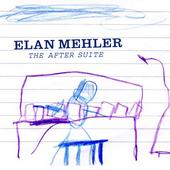

 Buy Now
Buy Now









